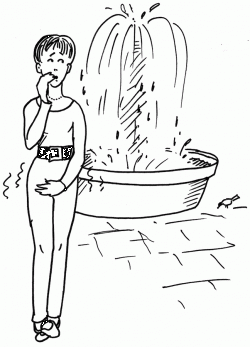Gotta go: Running water prompts trip to loo
Q. Why does hearing the sound of running water make us feel like we need to urinate? –P.W. Herman
A. Any time the human bladder senses a buildup, it sends a signal to the lower spinal cord, which reflexively returns an order back to the bladder, says University of Minnesota urologic surgeon Sean Elliott. This basic reflex loop explains why babies urinate every 20 minutes or so, in small amounts each time. With toilet training, we teach our brains to inhibit the bladder reflex, forestalling urination until a "socially appropriate" time.
For many of us, when we hear the sound of water running, it stimulates the urination coordination center in a portion of the brain called the pons that then stops sending inhibitory signals to the bladder and triggers the reflex to take over.
Q. In what sense was the game of checkers "solved" in 2007, and how might someone have died as a result? –W. Churchill
A. That was when computer scientist Jonathan Schaeffer and colleagues used computers to prove that checkers, when played perfectly, is a no-win game, says Clifford Pickover in The Math Book. This means that checkers, like Tic Tac Toe, will always end in a draw if the players make no wrong moves. Schaeffer's proof required hundreds of computers and over 18 years of work– the most complex game ever solved– and given that there are roughly 500 billion billion (500,000,000,000,000,000,000) possible checkers positions on the 8 x 8 board, this proof was far harder than the one for Tic Tac Toe.
The research team considered 39 trillion arrangements with 10 or fewer pieces on the board to determine if red or black would win, achieving a "major benchmark in the field of artificial intelligence."
In 1994, Schaeffer's "Chinook" program played world champion Marion Tinsley to a series of draws. When Tinsley died of cancer eight months later, "some chided Schaeffer for accelerating the death due to the stress Chinook placed on Tinsley," Pickover writes.
Q. Can you say the word "zoology" without falling into one of those "beastly mispronunciations"? –G. G. Williams
A. The beastly phrase is from language commentator Charles Harrington Elster's book There Is No Zoo in Zoology, who points out that "zoology"– like "biology," "sociology," "psychology" and others– refers to branches of knowledge ending in "-ology," says Mark Davidson in Right, Wrong, and Risky. Thus the word must begin with the sound "zoh," not "zoo," with the second "o" belonging to the second syllable.
Q. Where do you need to travel to be able to observe Earth's "blue hour"? –J. Glenn
A. In Why the Sky Is Blue, Gotz Hoeppe recalls gazing at the twilight sky from Capilla Peak in New Mexico: "The blue reminded me of stained-glass windows in a medieval cathedral. We seemed to be standing inside a huge sapphire. Slowly the stars began to appear one by one."
But you don't need to go to a mountaintop to enjoy the blue hour– it's an everyday phenomenon, visible to anyone paying attention. Poets and novelists have associated this deep brilliant blue with emotions of unfulfilled desire, melancholy, wanderlust. Scientists say we owe it all to the atmospheric ozone layer about 25-35 kilometers up (15-20 miles) that acts like a huge color filter even as it helps protect life. Fascinatingly, if life didn't exist on Earth, our sky wouldn't be blue at all but more likely tinged yellow or green.
~
Send Strange questions to brothers Bill and Rich at [email protected].
